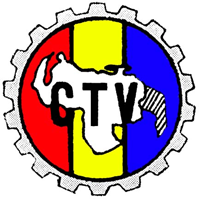Related Research Articles

The Confederación de Trabajadores de Venezuela is a federation of labor unions in Venezuela.

The World Confederation of Labour (WCL) was an international labour organization founded in 1920 and based in Europe. Fascist governments of the 1930s repressed the federation and imprisoned many of its leaders, limiting operations until the end of World War II. In 2006 it became part of the International Trade Union Confederation (ITUC), ending its existence as an independent organization.
Ieke van den Burg was a Dutch politician and a Member of the European Parliament (MEP).
The Organisation of African Trade Union Unity (OATUU) is an independent regional union federation aimed at unifying trade union centres in Africa. This organisation was founded in April, 1973 as a successor to two previously competing labour union organisations in Africa: the All-African Trade Union Federation (AATUF) and the African Trade Union Confederation (ATUC). The process to unify a Pan-African labour union organisation also involved international labour organisations as decision-making stakeholders like the International Confederation of Free Trade Unions (ICFTU) and the World Federation of Trade Unions (WFTU). Finally, also with the help of the Organisation of African Unity (OAU), the AATUF and the ATUC merged to form the OATUU. The driving factors for this unification and the creation of the OATUU was to advance Pan-Africanism, economic justice, and social justice throughout African workplaces.
The Belarusian Congress of Democratic Trade Unions was a confederation and center of trade unions in Belarus. It had 15,000 members in 4 affiliated unions and its headquarters were located in Minsk.

The Japanese Trade Union Confederation (JTUC), commonly known as RENGO, is the largest national trade union center in Japan, with over six million members as of 2011. It was founded in 1989 as a result of the merger of the Japan Confederation of Labor (Dōmei), the Federation of Independent Unions and the National Federation Of Industrial Organisations (Shinsanbetsu). In 1990, the General Council of Trade Unions of Japan (Sohyo) also joined RENGO.
The General Confederation of Lebanese Workers (CGTL) is a national trade union center in Lebanon. It was founded in 1958, and has a membership of 200,000. The original president of the confederation, Antoine Bechara, was president from 1983 to 1991 and created its logo.
A company or "yellow" union is a worker organization which is dominated or unduly influenced by an employer and is therefore not an independent trade union. Company unions are contrary to international labour law. They were outlawed in the United States by the 1935 National Labor Relations Act §8(a)(2), due to their use as agents for interference with independent unions. However, company unions persist in many countries.

The International Trade Union Confederation (ITUC) is the world's largest trade union federation.

Guy Bernard Ryder is a British international civil servant who currently serves as Under-Secretary-General for Policy at the United Nations.

SLOMR was a Romanian free trade union founded, without prior preparation, in February 1979, as a means to oppose the control exercised by the ruling Communist Party during the country's communist period. Initiated along the same lines as Solidarity, created one year later in the People's Republic of Poland, it grew to about 2,400 adherents within four weeks, and was dismantled by the authorities of Nicolae Ceaușescu's regime, coordinated by the Securitate, over the next three months.
Trade unions in Albania have had an unstable existence in recent decades, mirroring the regional political turbulence in Albania. Since the 1991 defeat of the Albanian Party of Labour (APL), independent trade unions have asserted themselves, with two main national trade union centres; the United Independent Albanian Trade Unions (BSPSh) and the Confederation of Trade Unions (KSSh).
Trade unions in Benin operate in relative freedom, with approximately 75% of the formal sector being unionized. There are, however, concerns expressed by the International Labour Organization (ILO) and the International Trade Union Confederation (ITUC) about the discrepancies between the government's Labour Code and the labour practices outlined by ILO Conventions 87 and 98 - specifically the right of unions to form without government approval, the right of seafarers to organize or strike, and restrictions on strikes.
Trade unions in Laos have been active in the country since at least the mid-20th Century.
The Confederation of Free Trade Unions of India is a trade union confederation in India. N. Kanaka Rao is the general secretary of CFTUI. CFTUI became a full member of the World Confederation of Labour in 1999. In 2003 the then CFTUI president Ashok Kumar Trivedi was assassinated.
Trade unions in Colombia were, until around 1990, among the strongest in Latin America. However the 1980s expansion of paramilitarism in Colombia saw trade union leaders and members increasingly targeted for assassination. As a result, Colombia has been the most dangerous country in the world for trade unionists for several decades. Between 1986 and 2010 over 2800 labor leaders were killed according to one source, and over 4000 according to others. Most assassinations were carried out by paramilitaries or the Colombian military; some were carried out by the guerrillas. In 2009 only around 4% of workers in Colombia were unionized.
Heribert Maier was an Austrian trade union leader.
The following is a list of international organizations in which the Philippines officially participates.
The National Coordination Committee for Workers' Education (NCCWE) is a national trade union centre in Bangladesh. The centre unites 14 national trade union federations. It is affiliated with the International Trade Union Confederation, the World Federation of Trade Unions and the International Transport Workers Federation. It is also supported by the International Labour Organization.
References
- ↑
- ICTUR; et al., eds. (2005). Trade Unions of the World (6th ed.). London, UK: John Harper Publishing. ISBN 0-9543811-5-7.
- ↑ "ILO joins forces with Timor-Leste Trade Union Confederation to end violence against women". ILO. 27 November 2023. Retrieved 31 December 2024.